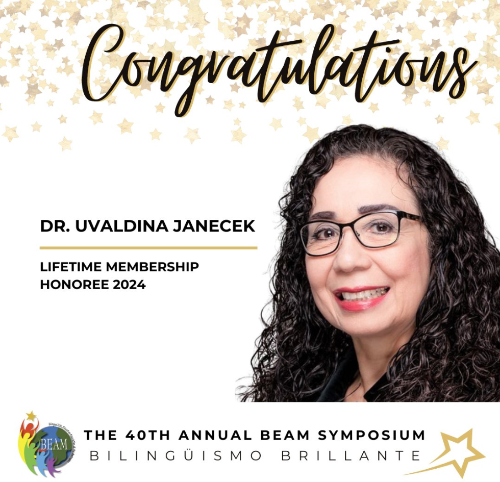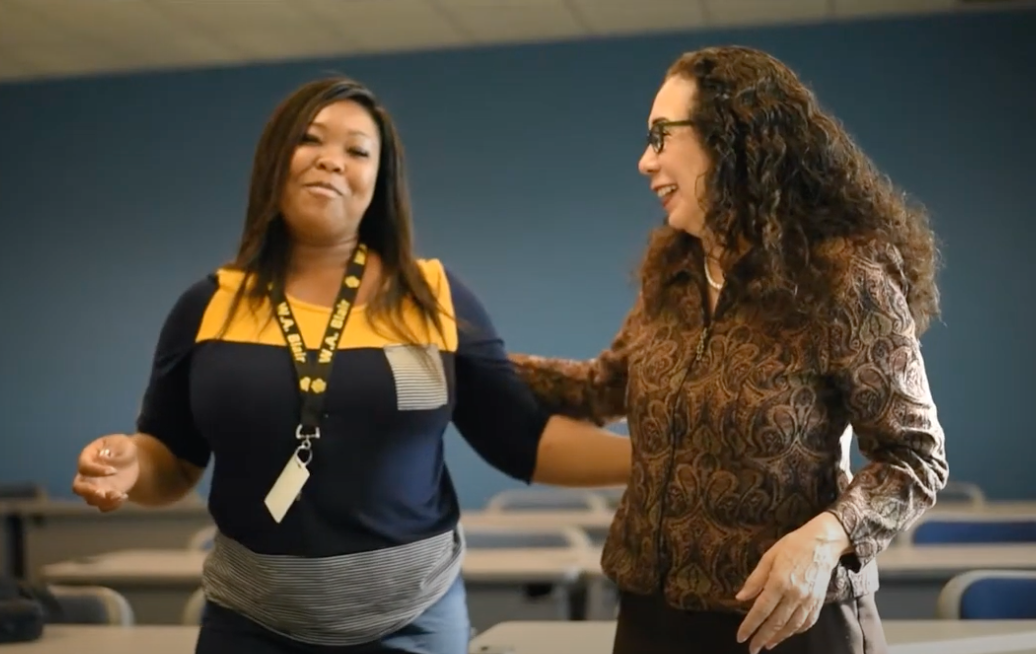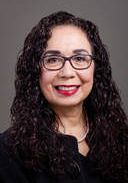Bilingual Educators Honor Dr. Uvaldina Janecek with Lifetime Membership Award
August 21, 2024
“It’s an art,” said Dr. Uvaldina Janecek, former UNT Dallas assistant professor of bilingual education, explaining the talent, dedication and patience it takes to teach people another language.
She should know. Dr. Janecek has spent decades as a bilingual educator in North Texas. This year, her colleagues and admirers at BEAM, the Bilingual Educators Association of the (DFW) Metroplex, honored her with a Lifetime Membership Award. “I was surprised. They usually give it to much older people,” she joked half seriously. “I’m never done. I will die at my desk.”

Before “retiring” and becoming an educational consultant, Dr. Janecek taught at UNT Dallas for five years. Before that, she spent time in the Desoto and Dallas school districts. “My passion is to help people understand,” Dr. Janecek said. “I was like a mother hen, and (school) districts need us.”
The need for bilingual teachers continues to grow in North Texas, throughout the state, and nationwide. The shortage is serious. It is one of the reasons the UNT Dallas School of Education is committed to nurturing future teachers with bilingual expertise. The high demand inspired the first-of-its-kind Teacher Residency Program at UNT Dallas in partnership with Dallas ISD, where five seniors will teach bilingual and ESL classes in elementary schools for the entire 2024-25 academic year.
The numbers explain why these teacher development programs are so necessary. One recent study cited by The Century Foundation revealed that only 13% of U.S. teachers speak a non-English language at home, compared with around 22 percent of people in the United States, and at least 21 percent of U.S. children.
Texas state law requires all subjects to be taught in English and Spanish. One of the benefits, Dr. Janecek said, is cognitive flexibility. “It allows you to play with words in your brain.” She often saw new English-speaking children outscore native English speakers by third grade – a testament to their diligence in studying and practicing the language.
Dr. Janecek’s dissertation for her Doctor of Philosophy degree at the University of Texas at Arlington (UTA) explored the children of Mexican immigrants in U.S. public schools from both teachers’ and parents’ perspectives.

BEAM promotes educational excellence for emergent bilingual learners and education professionals through education, collaboration and advocacy. The organization represents nearly 700 educators from more than 40 districts across the Metroplex. “We look out for each other,” Dr. Janecek said.
At BEAM’s 40th anniversary event earlier this year, Dr. Janecek received the coveted Lifetime Membership Award in recognition of her longtime service to students and fellow educators. She joined BEAM in 1989 when she became a teacher.
Back then, as is the case now, bilingual teachers and learners faced challenges. “They need to grasp concepts; you bring them along,” Dr. Janecek explained, referring to students, both children and adults, and the patience required of teachers. “You can’t magically wave a wand and speak English because you’re here now.”
Dr. Janecek admits she prefers teaching older students. “You can give adults feedback,” she said, “but children can’t take it.” Her preference for adult learners is one of the reasons she came to UNT Dallas in 2013 after five years in Desoto ISD classrooms.
Although it has been six years since she left her position at UNT Dallas, Dr. Janecek has remained active and connected to the university. She is a member of the executive board the Bilingual and ESL Education Student Association (BESO), where she mentors undergraduate and graduate students.

In a 2016 video interview with Nila Miller, who earned a Master’s degree in curriculum and instruction from UNT Dallas and now teaches at Dallas ISD, Dr. Janecek spoke about her persistence and determination. “I am mild-mannered on the outside, but I can dig my heels in. Outside, I’m sitting down, but inside, I am standing up, she said. “I’m fighting for marginalized people who don’t have a voice.”
One reason why is that Dr. Janecek was held back as a child, a brown student in a majority of white. She was a victim of discrimination by school leaders, who discouraged her from aspiring to attend top colleges and universities and told her to set her sights lower. “Children can be shoved to the background instead of celebrating that they have a different skill,” Dr. Janecek told Miller.
From looking backward to looking forward, Dr. Janecek said she wants to inspire future educators to stick with the profession despite its hurdles, arm them with defenses for themselves and students, pass the torch and light a fire under them so they can survive and help students thrive. Above all, she wants them to “be happy.”
The classroom, Dr. Janacek said, is a “prime spot to bring worlds together with languages.” Now that’s something to be happy about.